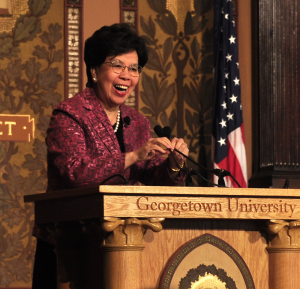
World Health Organization Director General Margaret Chan discussed the responsibility of governments and international organizations to address global health issues Friday in Gaston Hall at the second Global Futures Initiative lecture of this semester.
The event, entitled “Governance, Global Health, 21st Century Challenges,” continued the semester’s series topic of the future of global governance.
Vice President for Global Engagement Thomas Banchoff, who leads the Global Futures Initiative, began the event by connecting the topic of the lecture to the Sustainable Development Goals approved by the United Nations last weekend.
“Health connects to so many of the other goals, ranging from the elimination of poverty to the achievement of gender equality,” Banchoff said. “They are issues with a strong justice dimension that involve governance challenges at the local, national and international levels.”
University President John J. DeGioia then introduced Chan’s achievements in guiding the WHO through multiple health crises in her current position, which she assumed in 2006. Prior to her involvement in the WHO, she navigated the responses to avian influenza and severe acute respiratory syndrome as director of health in Hong Kong.
Chan began her discussion by stressing the importance of the government’s role in managing potential health threats, citing the misusage of antibiotics, vaccine refusal and the industrialization of food production as examples over the past century.
She then pointed to the danger of current health threats, many of which are tied to economic growth.
“Instead of diseases vanishing as living conditions improve, socioeconomic progress is actually creating the conditions that favor the rise of noncommunicable diseases,” Chan said. “Economic growth, modernization and urbanization have opened wide the entry point for the spread of unhealthy lifestyles.”
Chan said that health issues have significant implications on other aspects of livelihood.
“Health is related to nutrition. Health is linked to the environment. Health is also linked to water and sanitation. We need to think of a comprehensive, integrated approach to address the complex multiple challenges the world is giving us,” Chan said.
Chan also emphasized the necessity of collaboration between government offices and the community in overcoming health issues such as obesity.
“Ministers of health look at the medical evidence. They look at the science. But ministers of trade and finance often listen to other voices,” Chan said. “The health sector acting alone cannot protect children from the marketing of unhealthy food and beverages.”
Chan said that individuals should pressure their governments to pass legislation that prioritizes the health of their citizens, praising the efforts of Australian lawmakers who pushed for plain tobacco packaging.
“What is at stake here is nothing less than the sovereign right of a nation to enact legislation that protects its citizens from harm,” Chan said.
In addition, Chan said that the governments of countries need to work together to combat global health challenges.
“The newer threats to health also lie beyond the traditional domain of sovereign nations,” Chan said. “In a world of radical interdependence, all of these threats are transboundary. The globalized marketing of unhealthy products respects no borders. … Drug-resistant pathogens travel very well internationally. They don’t need visas.”
Chan acknowledged the failings of the WHO in providing an immediate response to the Ebola crisis in late 2013.
“The Ebola outbreak shattered the notion that a disease of poor African nations will have no consequences elsewhere,” Chan said. “The WHO and the international community were too slow to recognize the explosive potential of the outbreak. The world as a whole lacked the adequate response capacity.”
Chan said that in the aftermath of global disease outbreaks, the WHO has worked on incentivizing countries to act together in solidarity.
“The tension between sovereign states and being a good global citizen as part of global solidarity is a tension we need to address,” Chan said. “I put together a list of countries to come together and look at the International Health Regulations [to create] incentivizes for countries to report early, support for countries to build capacities, and disincentivizes for governments who overreact.”
In a question-and-answer session that followed her speech, Chan said that the Ebola outbreak was an indicator that the WHO needed to reform its practices.
“We did not invest in our capacity and our preparedness for huge outbreaks, especially in fragile states,” Chan said. “We did not anticipate the challenge. We need to change that.”
Shashank Rai (GRD ’17) said that he enjoyed the connections Chan made between health and governance issues.
“The talk really put things into perspective for me as a public policy student,” Rai said. “It created an understanding of how important some of these issues could be. The lecture followed up on previous governance issues, which is more important than just having an understanding of health.”




















